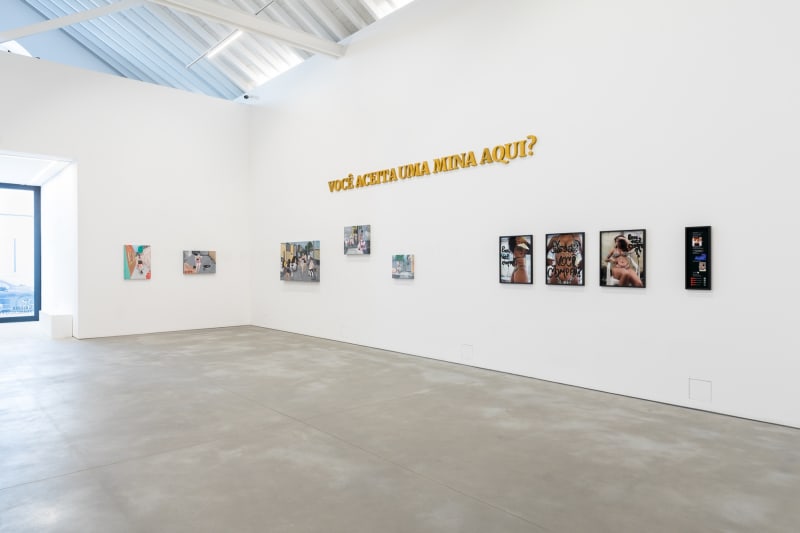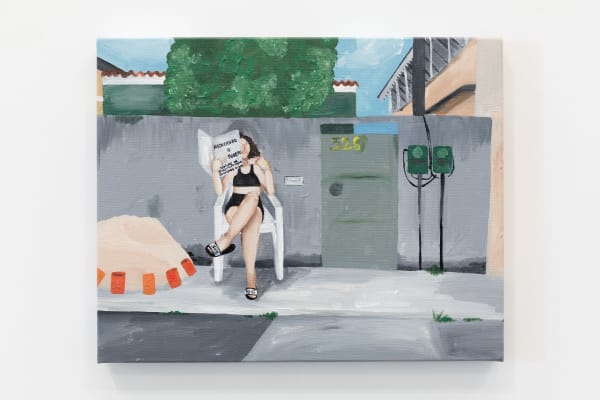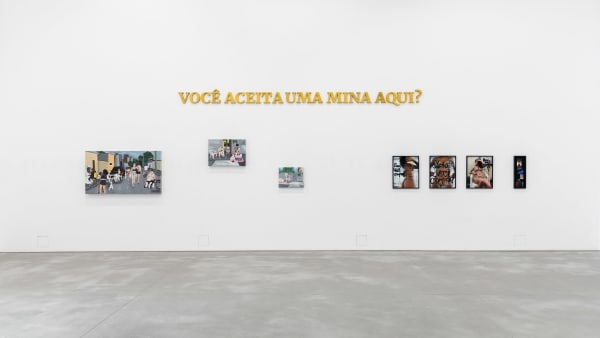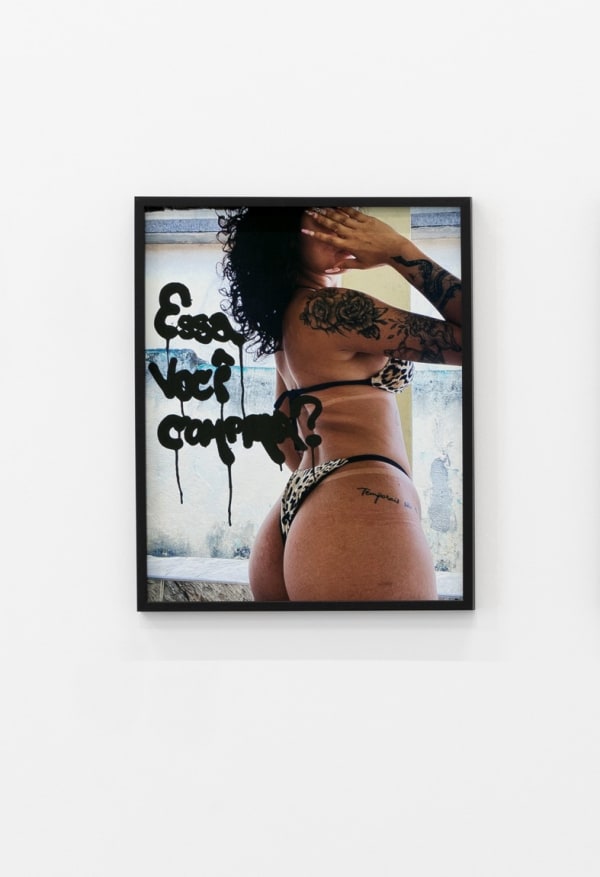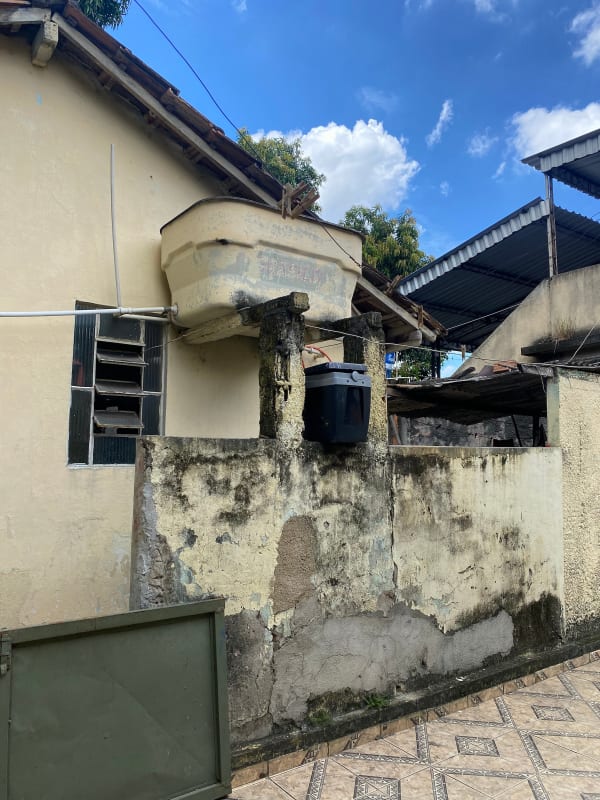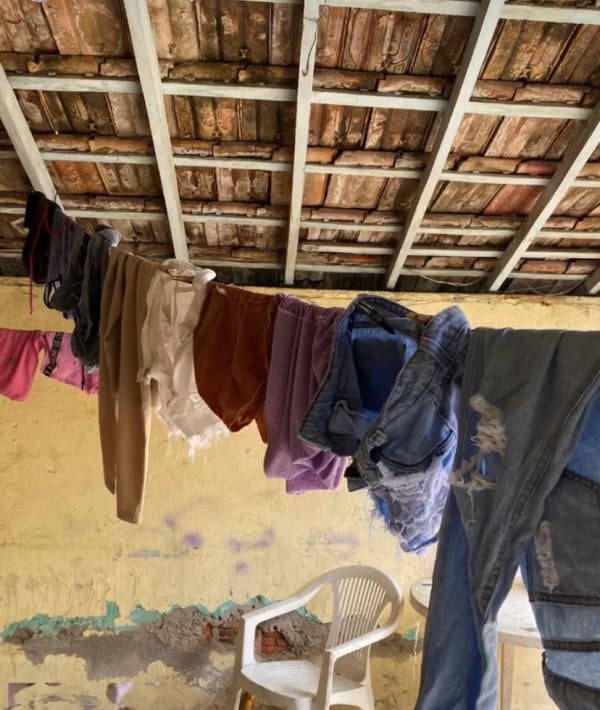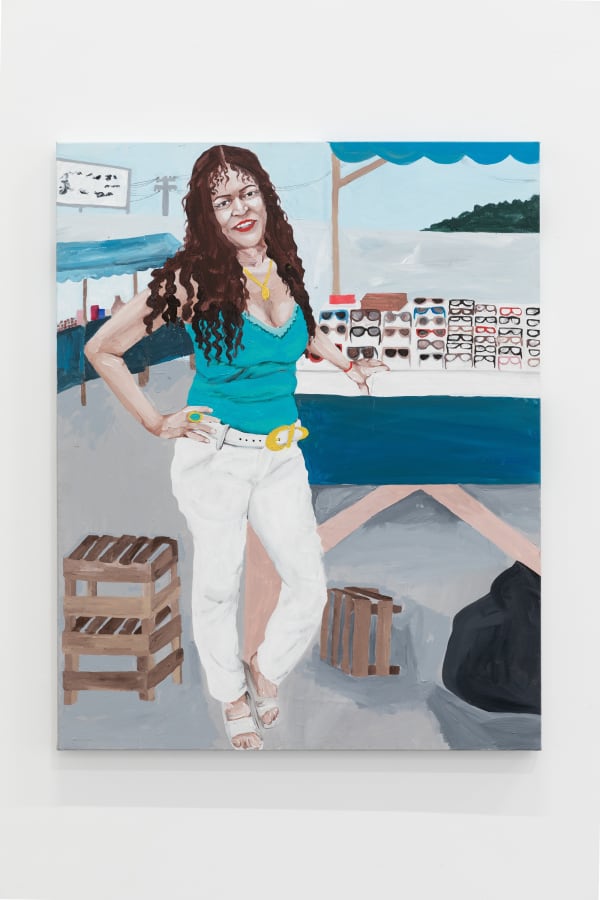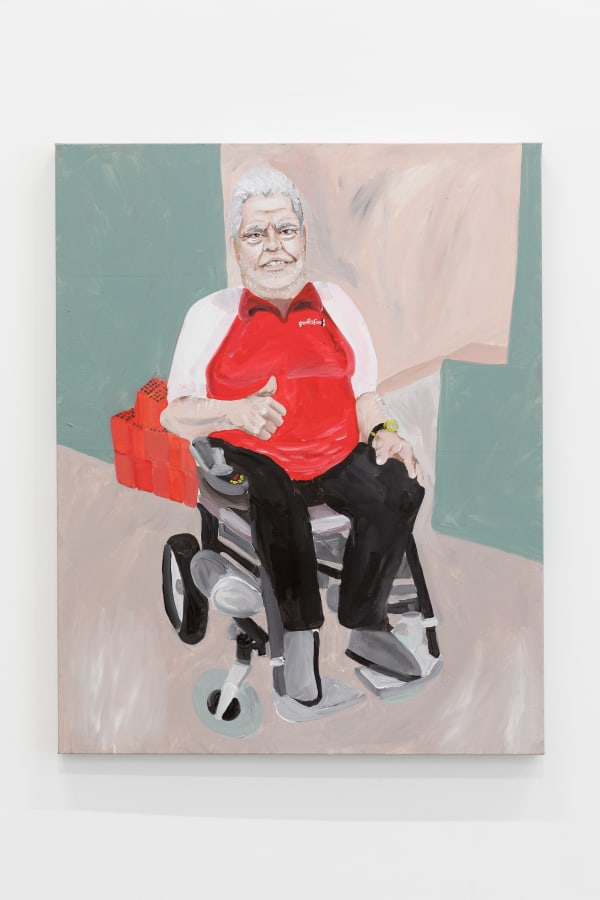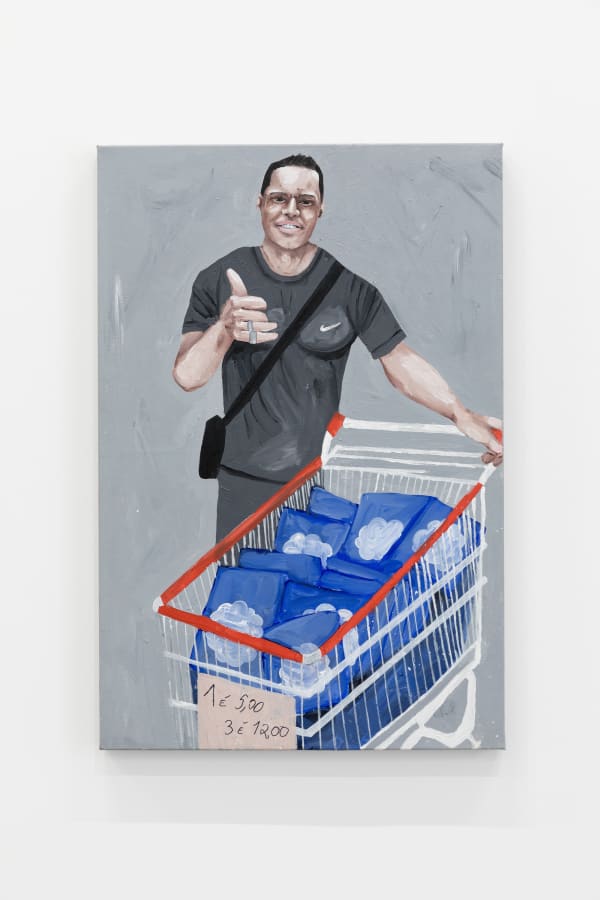Protagonizando a Cena: Priscila Rooxo
Over the last few years we have witnessed an intense historical review from an anticolonial point of view, which seeks to understand the epistemological forms of violence that have shaped art history. At the core of this change, women artists have gained increased prominence. But notice here that "woman" should not be treated as a universal category, given that it is constantly traversed by different social, geographical and temporal markers that greatly transform the experience of being a woman.
The exhibition Protagonizando a cena by Priscila Rooxo at Galeria Francisco Fino is part of this context. All works exhibited here contain indicators of the place where the artist (born in 2001) lives: the region of Baixada Fluminense in the periphery of Rio de Janeiro. But in contrast to the forms of representation that are often perpetuated by a white gaze, Rooxo portrays the world where she lives driven not by a desire to translate what exists in terms of violence, poverty and pain but to affirm the right to have fun and the right to citizenship and alternative modes of work and sociability. In other words, the artist challenges expectations, offering us a narrative that longs for a present and a future that differ from those that have since time immemorial been written for women from her background. [1]
Rooxo's paintings, in which she portrays scenes from her daily life - clothes, suggestions of funk carioca, dancing, chit-chatting on the pavement between beer and barbecue, being on the beach with her girlfriends, caring for children, working - remember that "the personal is political". It is via the detailed observation of the customs that shape her experience, and the experience of those who surround her, that Rooxo builds her practice, providing it with a singular critical voltage. Here we have an artist-ethnographer whose object of study is her own environment.
The gesture that frustrates the expected ways of representing those who have always been made invisible includes the portrayal of things as they are and also how they could be. In the series of paintings titled Família, for instance, the departure point is a question that the artist asked her relatives about how they would like to be portrayed. As such, for Rooxo, identity is not something fixed but a fluid traffic between "reality" and imagination. This approach includes a sort of ethics of caring around her practice and the people that surround her. This same gesture can also be seen in the series Suporte caro. [2]
The displacement of expected roles continues in the works that challenge the field of art itself and its relationship with the recent and disruptive presence of subjects that until recently were absent from a landscape that was almost always elitist, white and male. This is something we see both in the paintings where the artist is portrayed in spaces dedicated to the arts and in the photographic series Essa você compra? and on the billboard Você aceita uma mina aqui?. In all of them, we witness the questioning of the sense of strangeness and fear that the body of a spirited peripheral woman - away from the expected role of a silent accessory - causes in the environment of the so-called "world of art". In Essa você compra?, Rooxo doubles the bet and turns her own body into the core of the scene, giving us back, in a boomeranged motion, the objectified image which she is so often the target of.
Whilst it is a fact that the act of giving "voice", "room" and "attention" to those who have never had visibility has become part of the contemporary art game - turning alterity into a commodity - so is the profound transformation that the field of art has experienced with the presence of artists such as Priscila Rooxo. The practice of this artist from Mesquita, a municipality of Baixada Fluminense, in an art gallery in Lisbon marks an encounter of opposites that serves as a reminder that the possibility for a healthy social body is not guaranteed by a respectful distance, but, instead, it is an uncomfortable and contentious proximity that will ultimately waken us to the other so we can imagine new and unprecedented ways of living together.
Luisa Duarte
[1] The beginning of Priscila Rooxo's career is marked by a strong link with Rede NAMI (Feminist Urban Art Network) created by artist Panmela Castro, for whom Rooxo worked as assistant. Castro is portrayed in one of the paintings in the current exhibition.
[2] With regards to the place of the "other" in the current contemporary art debate see: Bonaventure Soh Bejeng Ndikung's Dis-othering as method (LEH ZO, A ME KE NDE ZA), published in the catalogue of the 21st SESC Vídeo Brasil Biennial _ Imagined Communities, curated by Solange Farkas, Gabriel Bogossian, Luisa Duarte and Miguel López, Editora Sesc, São Paulo, 2019.
-
 Priscila RooxoDias de luta I, 2022Acrylic on canvas70 x 50 x 4 cm
Priscila RooxoDias de luta I, 2022Acrylic on canvas70 x 50 x 4 cm -
 Priscila RooxoQuem vê close, não vê corre, 2023Acrylic on canvas50 x 70 x 6 cm
Priscila RooxoQuem vê close, não vê corre, 2023Acrylic on canvas50 x 70 x 6 cm -
 Priscila RooxoRua Vênus II, 2023Acrylic on canvas80 x 140 x 8 cm
Priscila RooxoRua Vênus II, 2023Acrylic on canvas80 x 140 x 8 cm -
 Priscila RooxoPortão, 2023Acrylic on canvas50 x 70 x 6 cm
Priscila RooxoPortão, 2023Acrylic on canvas50 x 70 x 6 cm -
 Priscila RooxoHackeando o poder, 2023Acrylic on canvas38 x 48 x 4,5 cm
Priscila RooxoHackeando o poder, 2023Acrylic on canvas38 x 48 x 4,5 cm -
 Priscila RooxoVocê aceita uma mina aqui?, 2023Glitter on MDF wood25 x 461 cm
Priscila RooxoVocê aceita uma mina aqui?, 2023Glitter on MDF wood25 x 461 cm
Variable dimensionsEdition of 1 plus 1 artist's proof -
 Priscila RooxoEssa você compra? I, 2023Posca marker on inkjet print on Radiant paper62,5 x 50,5 x 3 cmEdition of 1 plus 1 artist's proof
Priscila RooxoEssa você compra? I, 2023Posca marker on inkjet print on Radiant paper62,5 x 50,5 x 3 cmEdition of 1 plus 1 artist's proof -
 Priscila RooxoEssa você compra? II, 2023Posca marker on inkjet print on Radiant paper62,5 x 50,5 x 3 cmEdition of 1 plus 1 artist's proof
Priscila RooxoEssa você compra? II, 2023Posca marker on inkjet print on Radiant paper62,5 x 50,5 x 3 cmEdition of 1 plus 1 artist's proof -
 Priscila RooxoEssa você compra? III, 2023Posca marker on inkjet print on Radiant paper62,5 x 50,5 x 3 cmEdition of 1 plus 1 artist's proof
Priscila RooxoEssa você compra? III, 2023Posca marker on inkjet print on Radiant paper62,5 x 50,5 x 3 cmEdition of 1 plus 1 artist's proof -
 Priscila RooxoEssa você compra? IV, 2023Inkjet print on Radiant paper62,5 x 22,5 x 3 cmEdition of 1 plus 1 artist's proof
Priscila RooxoEssa você compra? IV, 2023Inkjet print on Radiant paper62,5 x 22,5 x 3 cmEdition of 1 plus 1 artist's proof -
 Priscila RooxoÉ sobre vida, 2023Acrylic on canvas60 x 90 x 6 cm
Priscila RooxoÉ sobre vida, 2023Acrylic on canvas60 x 90 x 6 cm -
 Priscila RooxoSuporte caro IV, 2023Acrylic on prepared linen fabric90 x 70 cm
Priscila RooxoSuporte caro IV, 2023Acrylic on prepared linen fabric90 x 70 cm -
 Priscila RooxoSuporte caro V, 2023Acrylic on prepared linen fabric90 x 70 cm
Priscila RooxoSuporte caro V, 2023Acrylic on prepared linen fabric90 x 70 cm -
 Priscila RooxoSuporte caro VI, 2023Acrylic on prepared linen fabric90 x 70 cm
Priscila RooxoSuporte caro VI, 2023Acrylic on prepared linen fabric90 x 70 cm -
 Priscila RooxoArtistas do ano, 2023Acrylic on canvas70 x 50 x 6 cm
Priscila RooxoArtistas do ano, 2023Acrylic on canvas70 x 50 x 6 cm -
 Priscila RooxoEstética de exposição II, 2023Acrylic on canvas50 x 70 x 6 cm
Priscila RooxoEstética de exposição II, 2023Acrylic on canvas50 x 70 x 6 cm -
 Priscila RooxoRegistro 15, 2023Inkjet print on Radiant paper21 x 14 cm
Priscila RooxoRegistro 15, 2023Inkjet print on Radiant paper21 x 14 cm
35,5 x 30 x 3 cm (framed)Edition of 3 plus 1 artist's proof -
 Priscila RooxoRegistro 18, 2023Inkjet print on Radiant paper30 x 21 cm
Priscila RooxoRegistro 18, 2023Inkjet print on Radiant paper30 x 21 cm
37 x 44 x 3 cm (framed)Edition of 3 plus 1 artist's proof -
 Priscila RooxoRegistro 3, 2023Inkjet print on Radiant paper30 x 21 cm
Priscila RooxoRegistro 3, 2023Inkjet print on Radiant paper30 x 21 cm
35 x 26 x 3 cm (framed)Edition of 3 plus 1 artist's proof -
 Priscila RooxoRegistro 5, 2023Inkjet print on Radiant paper30 x 21 cm
Priscila RooxoRegistro 5, 2023Inkjet print on Radiant paper30 x 21 cm
35 x 26 x 3 cm (framed)Edition of 3 plus 1 artist's proof -
 Priscila RooxoRegistro 4, 2023Inkjet print on Radiant paper21 x 14 cm
Priscila RooxoRegistro 4, 2023Inkjet print on Radiant paper21 x 14 cm
35 x 31 x 3 cm (framed)Edition of 3 plus 1 artist's proof -
 Priscila RooxoRegistro 11, 2023Inkjet print on Radiant paper21 x 14 cm
Priscila RooxoRegistro 11, 2023Inkjet print on Radiant paper21 x 14 cm
35 x 30 x 3 cm (framed)Edition of 3 plus 1 artist's proof -
 Priscila RooxoRegistro 9, 2023Inkjet print on Radiant paper21 x 14 cm
Priscila RooxoRegistro 9, 2023Inkjet print on Radiant paper21 x 14 cm
35 x 30 x 3 cm (framed)Edition of 3 plus 1 artist's proof -
 Priscila RooxoRegistro 10, 2023Inkjet print on Radiant paper21 x 14 cm
Priscila RooxoRegistro 10, 2023Inkjet print on Radiant paper21 x 14 cm
35 x 30 x 3 cm (framed)Edition of 3 plus 1 artist's proof -
 Priscila RooxoRegistro 14, 2023Inkjet print on Radiant paper21 x 14 cm
Priscila RooxoRegistro 14, 2023Inkjet print on Radiant paper21 x 14 cm
35 x 32 x 3 cm (framed)Edition of 3 plus 1 artist's proof -
 Priscila RooxoRute Bezerra, Mãe, 2022Acrylic on canvas100 x 80 x 4 cm
Priscila RooxoRute Bezerra, Mãe, 2022Acrylic on canvas100 x 80 x 4 cm -
 Priscila RooxoJosé Renato, Pai, 2022Acrylic on canvas100 x 80 x 4 cm
Priscila RooxoJosé Renato, Pai, 2022Acrylic on canvas100 x 80 x 4 cm -
 Priscila RooxoPaula Maria, irmã, 2022Acrylic on canvas90 x 60 x 4 cm
Priscila RooxoPaula Maria, irmã, 2022Acrylic on canvas90 x 60 x 4 cm -
 Priscila RooxoRafael Vinicius, irmão, 2022Acrylic on canvas90 x 60 x 4 cm
Priscila RooxoRafael Vinicius, irmão, 2022Acrylic on canvas90 x 60 x 4 cm -
 Priscila RooxoDiogo Adriano, irmão, 2023Acrylic on canvas90 x 60 x 6 cm
Priscila RooxoDiogo Adriano, irmão, 2023Acrylic on canvas90 x 60 x 6 cm -
 Priscila RooxoRegistro 19, 2023Inkjet print on Radiant paper21 x 14 cm
Priscila RooxoRegistro 19, 2023Inkjet print on Radiant paper21 x 14 cm
35 x 30 x 3 cm (framed)Edition of 3 plus 1 artist's proof -
 Priscila RooxoRegistro 8, 2023Inkjet print on Radiant paper21 x 14 cm
Priscila RooxoRegistro 8, 2023Inkjet print on Radiant paper21 x 14 cm
35 x 28,5 x 3 cm (framed)Edition of 3 plus 1 artist's proof

